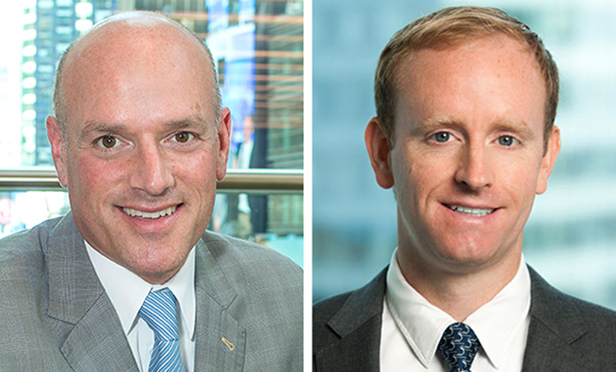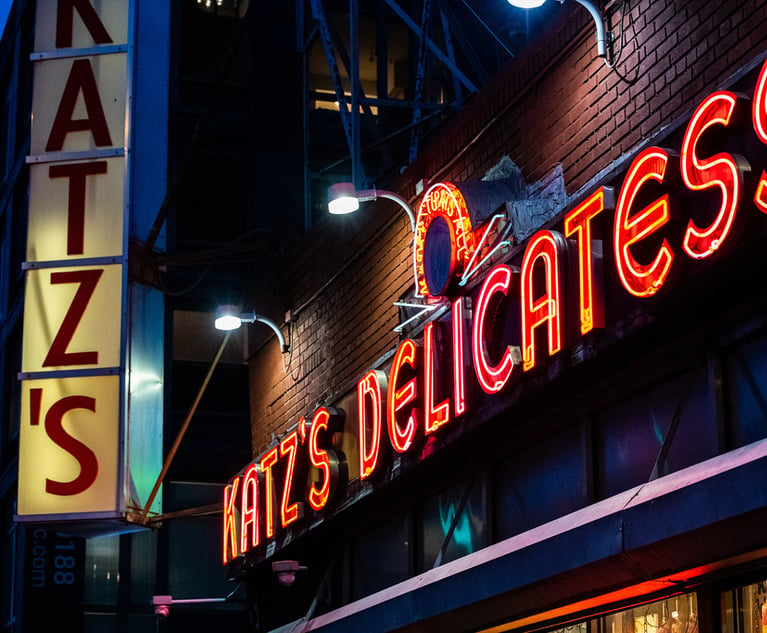Hospitality Industry and Covid 19: The Severance Reckoning
With occupancy levels likely to remain well below historical norms for the foreseeable future, and hotel employees and their union representatives demanding that strict safety protocols be put in place before employees return to work, hotel owners and operators are preparing themselves for the next reckoning: what to do with furloughed employees that remain unneeded given the low levels of demand, but will expect sizeable severance if the furloughs persist and become a permanent layoff.
July 07, 2020 at 02:49 PM
7 minute read
 Todd E. Soloway and Bryan T. Mohler
Todd E. Soloway and Bryan T. Mohler
Since April, when we last wrote concerning the tumult and uncertainty caused by the pandemic, the hospitality industry remains in a constant state of flux as hotel owners and operators consider whether and how to reopen. While some states continue the slow reopening process, others have begun to close down once again due to the continued rise of confirmed positive COVID-19 cases. In many cases, the areas where the virus was considered under control in April (such as Florida and Texas) now face growing infections, while areas hard hit in April (like New York City) are cautiously reopening as the number of reported cases fall. No one can say what will happen next week, let alone next month or next quarter, and uncertainty is the new normal.
With occupancy levels likely to remain well below historical norms for the foreseeable future, and hotel employees and their union representatives demanding that strict safety protocols be put in place before employees return to work, hotel owners and operators are preparing themselves for the next reckoning: what to do with furloughed employees that remain unneeded given the low levels of demand, but will expect sizeable severance if the furloughs persist and become a permanent layoff.
In many jurisdictions, whether pursuant to an agreement between the hotel owner and operator, and/or a collective bargaining agreement with a union, or by force of an arbitral award, hotel employees are often entitled to severance payments calculated based on their time of service. For union employees, collective bargaining agreements generally provide a formula, though in practice unions often seek to impose additional "market" severance obligations than those contractually called for by the CBA. For non-union employees, operators generally have severance policies that owners are asked to honor.
Pursuant to an arbitral award issued in March, New York hotels that are signatories to the Industry-Wide Agreement (the IWA) with the New York Hotel Trades Council; AFL-CIO are required to pay for certain health benefit contributions for a four-month period following furlough, the end of which is soon approaching. It is unclear from the arbitral award whether those unionized employees will be due severance at the end of the four-month period, but owners and operators should expect the union to take measures to protect their constituents as the conclusion of this period approaches.
In the same award, the arbitrator held that hotels that are signatories to the Greater Regional Industry-Wide Agreement (GRIWA) will be required to pay their employees severance once their layoffs exceed six months. With hotels remaining closed, and some opening but without bringing back their full staff, all-told millions of dollars of severance pay may soon be due to these furloughed employees.
Owners and operators should take several steps to prepare for this coming issue. First, owners and operators should review all relevant agreements, including the management agreement and any collective bargaining agreements that outline the rights of the hotel's employees, to determine who will be responsible to make these payments. Generally, the party that is classified as the "employer" under a CBA will be liable for employment-related liabilities such as severance.
While hotel management agreements ordinarily state that the hotel operator is the employer of any hotel employees, management agreements also generally provide that owners are responsible for all employment-related costs (including severance), and contain indemnification provisions broad enough to cover any employment-related liabilities.
The owner may also be deemed an "employer" with direct liability if the hotel management agreement authorizes the operator to sign a collective bargaining agreement on behalf of the hotel, or if the owner signs the collective bargaining agreement. For instance, the IWA includes both the owner and the operator in the definition of employer, and the New York Hotel Trades Council; AFL-CIO has traditionally required both owners and operators to assume the IWA as the "employer." In instances where both the owner and operator are deemed to be an "employer," the union may attempt to assess liability against one of, or both of, the hotel owner and operator.
Second, applicable labor laws should also be examined in order to assess whether hotel owners and operators may face additional and unexpected liabilities, including personal liability to shareholders, executives and managerial staff. In New York, for example, there are several different statutes that could affect who will be liable to an employee for severance pay.
Under the New York Labor Law, any person, corporation, limited liability company or association employing any individual may be deemed to be an employer if he, she, or it meets a four-factor economic reality test which examines whether the individual or entity (1) had the power to hire and fire the employees; (2) supervised and controlled employee work schedules or conditions of employment; (3) determined the rate and method of payment; and (4) and maintained employment records. Under this framework, New York courts have assessed liability against corporate entities, as well as management and executives in their individual capacity.
Furthermore, under Section 630 of the New York Business Corporation law, the ten largest shareholders of a private corporation are jointly and severally "liable for all debts, wages or salaries due and owing to any of its laborers, servants or employees other than contractors, for services performed by them for such corporation." In other words, if a corporation fails to pay an employee his or her wages or severance, the employee may sue and collect from, subject to certain procedural prerequisites, the ten largest shareholders of the employer. Section 609 of the New York Limited Liability law similarly extends such liability to the ten largest members of any limited liability company that is an employer in New York.
Third, owners and operators of hotels with non-union staff should examine whether there are any contractual or statutory obligations to these employees. If a non-union hotel owes severance to its employees pursuant to an employment agreement and fails to pay such severance, the employee will have a claim for breach of contract and, depending on the applicable state law, may be able to assert personal liability against the owner's and/or operator's principals, as outlined above.
With the issue of severance likely coming to a head in the immediate future, disputes are inevitable among the industry stakeholders. Unions will be aggressive to protect their constituents. Operators who are initially liable as employers will face a hard time convincing owners—cash-strapped, often single purpose entities—to fund cash to pay severance for tens, if not hundreds, of employees.
On the other hand, owners—especially those of non-unionized hotels—will demand to see the basis of severance owed to employees, whether pursuant to a collective bargaining agreement, contract with the employee, or the operator's internal policies. All of these disputes and negotiations will take place in an uncertain environment where the once unimaginable is now the norm, and the usual negotiating positions may no longer work, requiring outside-the-box thinking and creativity. Challenges and opportunities will abound.
Todd E. Soloway leads the Hotel and Hospitality Group at Pryor Cashman and co-heads the firm's litigation practice. Bryan T. Mohler is a partner in the firm's Hotel and Hospitality and Litigation Groups. Itai Raz, an associate in the firm's litigation group, assisted in the preparation of the article.
This content has been archived. It is available through our partners, LexisNexis® and Bloomberg Law.
To view this content, please continue to their sites.
Not a Lexis Subscriber?
Subscribe Now
Not a Bloomberg Law Subscriber?
Subscribe Now
NOT FOR REPRINT
© 2025 ALM Global, LLC, All Rights Reserved. Request academic re-use from www.copyright.com. All other uses, submit a request to [email protected]. For more information visit Asset & Logo Licensing.
You Might Like
View All
Here’s Looking at You, Starwood: A Piercing the Corporate Veil Story?
7 minute read
NYC’s Oldest Deli Agrees to Update Bathrooms, Entrances to End ADA Charges
4 minute read

Law Firms Mentioned
Trending Stories
- 1Litigators of the Week: A $630M Antitrust Settlement for Automotive Software Vendors—$140M More Than Alleged Overcharges
- 2Litigator of the Week Runners-Up and Shout-Outs
- 3Linklaters Hires Four Partners From Patterson Belknap
- 4Law Firms Expand Scope of Immigration Expertise, Amid Blitz of Trump Orders
- 5Latest Boutique Combination in Florida Continues Am Law 200 Merger Activity
Who Got The Work
J. Brugh Lower of Gibbons has entered an appearance for industrial equipment supplier Devco Corporation in a pending trademark infringement lawsuit. The suit, accusing the defendant of selling knock-off Graco products, was filed Dec. 18 in New Jersey District Court by Rivkin Radler on behalf of Graco Inc. and Graco Minnesota. The case, assigned to U.S. District Judge Zahid N. Quraishi, is 3:24-cv-11294, Graco Inc. et al v. Devco Corporation.
Who Got The Work
Rebecca Maller-Stein and Kent A. Yalowitz of Arnold & Porter Kaye Scholer have entered their appearances for Hanaco Venture Capital and its executives, Lior Prosor and David Frankel, in a pending securities lawsuit. The action, filed on Dec. 24 in New York Southern District Court by Zell, Aron & Co. on behalf of Goldeneye Advisors, accuses the defendants of negligently and fraudulently managing the plaintiff's $1 million investment. The case, assigned to U.S. District Judge Vernon S. Broderick, is 1:24-cv-09918, Goldeneye Advisors, LLC v. Hanaco Venture Capital, Ltd. et al.
Who Got The Work
Attorneys from A&O Shearman has stepped in as defense counsel for Toronto-Dominion Bank and other defendants in a pending securities class action. The suit, filed Dec. 11 in New York Southern District Court by Bleichmar Fonti & Auld, accuses the defendants of concealing the bank's 'pervasive' deficiencies in regards to its compliance with the Bank Secrecy Act and the quality of its anti-money laundering controls. The case, assigned to U.S. District Judge Arun Subramanian, is 1:24-cv-09445, Gonzalez v. The Toronto-Dominion Bank et al.
Who Got The Work
Crown Castle International, a Pennsylvania company providing shared communications infrastructure, has turned to Luke D. Wolf of Gordon Rees Scully Mansukhani to fend off a pending breach-of-contract lawsuit. The court action, filed Nov. 25 in Michigan Eastern District Court by Hooper Hathaway PC on behalf of The Town Residences LLC, accuses Crown Castle of failing to transfer approximately $30,000 in utility payments from T-Mobile in breach of a roof-top lease and assignment agreement. The case, assigned to U.S. District Judge Susan K. Declercq, is 2:24-cv-13131, The Town Residences LLC v. T-Mobile US, Inc. et al.
Who Got The Work
Wilfred P. Coronato and Daniel M. Schwartz of McCarter & English have stepped in as defense counsel to Electrolux Home Products Inc. in a pending product liability lawsuit. The court action, filed Nov. 26 in New York Eastern District Court by Poulos Lopiccolo PC and Nagel Rice LLP on behalf of David Stern, alleges that the defendant's refrigerators’ drawers and shelving repeatedly break and fall apart within months after purchase. The case, assigned to U.S. District Judge Joan M. Azrack, is 2:24-cv-08204, Stern v. Electrolux Home Products, Inc.
Featured Firms
Law Offices of Gary Martin Hays & Associates, P.C.
(470) 294-1674
Law Offices of Mark E. Salomone
(857) 444-6468
Smith & Hassler
(713) 739-1250






